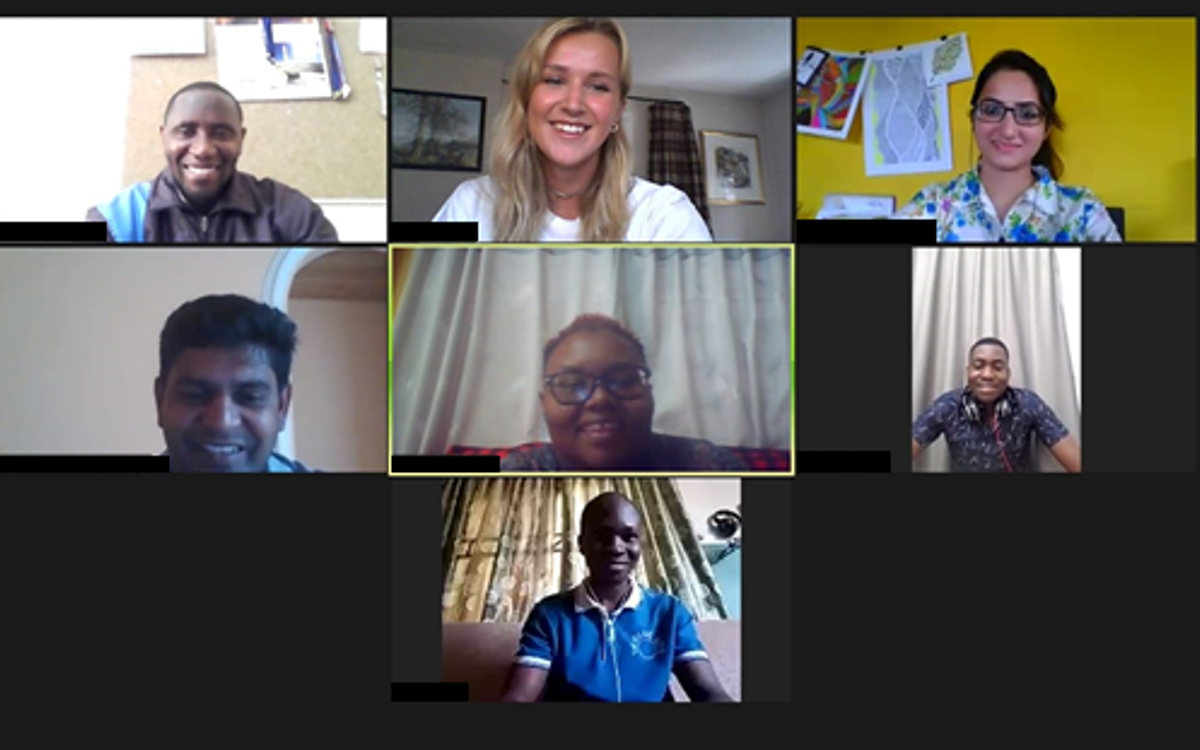
Even at a distance, we find ways to connect. The pandemic has presented a unique set of challenges for higher education and the world globally. However, exceptional circumstances generate creative and resilient solutions.
This year’s ACU Summer School was like no other. Rather than physically hosting the event at the University of Cape Coast (UCC), ACU Summer School 2020: The migration generation? Climate, youth and refugees' saw 50 students connect virtually, from 3-14 August, to examine themes relating to migration.
The programme was creatively adapted to nurture rich, meaningful intercultural experiences from afar. By harnessing digital solutions, the ACU and UCC worked together to overcome the physical barriers imposed by COVID-19 to deliver an inclusive, virtual global classroom.
ACU Summer School 2020 has shown that we are versatile, we are adaptable, and we have the capacity to respond to emergencies and pursue lasting partnerships

Students from different countries and time zones across the Commonwealth – from Sierra Leone to India – came together online to engage in meaningful conversations about refugees and migration. This year’s ACU Summer School explored multi-faceted elements of migration: health, gender, marginalised communities, labour market participation, and climate change; as well as the push-pull factors which influence people to migrate. A host of expert speakers provided subject-specific academic expertise through panel discussions, seminars, and Q&As. The discussions were framed around important questions such as: who is migrating and why? How can young migrants be supported and encouraged to create their own narratives and share their own stories?
The programme invited students to contextualise these global themes and questions within their own local contexts. The result was a series of rich conversations and case studies from different countries and regions – each invoking different perspective
- Dr Samuel Agblorti, Senior Lecturer, University of Cape Coast, Ghana
- Professor Mariama Awumbila, Associate Professor, University of Ghana
- Dr Veronica Fynn-Bruey, Faculty Affiliate at Seattle University School of Law, USA
- Dr Leander Kandilige, University of Ghana
- Professor Tasneem Siddiqui, Refugee and Migratory Movements Research Unit, University of Dhaka, Bangladesh
- Professor Augustine Tanle, Department of Population and Health, University of Cape Coast, Ghana
- Professor Jo Vearey, African Centre for Migration and Society, University of the Witwatersrand, South Africa
- Dr Elijah Yendaw, Lecturer at the University for Development Studies, Ghana
Fostering opportunities to learn about different cultures was an integral part of the programme. From a virtual tour of Elmina Castle – a UNESCO World Heritage Site in Ghana steeped in colonial history – to a Ghanaian history and cultural heritage lecture and Q&A, the programme offered a virtual mobility experience, enabling students to explore a new country from the comfort of their homes.
Reflecting on their experience, one student commented that the ACU Summer School highlighted that ‘there is strength in diversity’. This diversity was reflected not just by the different nationalities in attendance, but also the way in which the programme called upon a range of voices spanning different industries and disciplines.
It's amazing how people from different countries and fields – from agriculture to social work – were able to come together to participate in this important topic.

We heard from a varied line-up of academics, non-governmental organisation (NGO) workers, historians, researchers, and artists – including a live conversation between Ghanaian author Nii Ayikwei Parkes and Awo Ablo from the Tony Blair Institute for Global Change, about migration, neo-colonialism, art, culture, and identity.
Physical distance did not stop students from getting to know each other. Throughout the event, delegates from across the Commonwealth kept conversations going on social media. From exchanging recipes and photos of traditional food from their home countries, to discussing their favourite books, students congregated online to interact and learn about each other’s customs – providing a window into each other’s cultures to help forge meaningful connections.
As one of the panellists judging the students’ presentations, Kirsty Cockburn, ACU Director of External Engagement, commented ‘It was an experiment necessitated by COVID-19 but the result has far exceeded everyone’s hopes. It was telling to me that as the event drew to an official close there seemed to be a reluctance on the part of the participants to actually leave the Zoom “room”. Across a fortnight, friendships had blossomed, research collaborations had been forged, and a group of committed and talented people had worked across time zones and national boundaries to share ideas and elicit change. It was an exciting, positive and thoughtful workshop and demonstrated the dynamic ways people can work together – even when they can’t physically be in the same space.’
More information
The ACU Summer School provides a forum for students from every corner of the Commonwealth to discuss multidisciplinary issues of global importance. Established in 2011, a key element of the School is its aim to mix local and regional students with their peers who may have not had the opportunity to leave their own regions. This year’s ACU Summer School was delivered as a part of the ACU Digital Now series. ACU Digital Now is our commitment to ensuring that our vibrant global network continues to thrive. We are using digital solutions to cross borders, narrow divides, and create access to inspire change.
